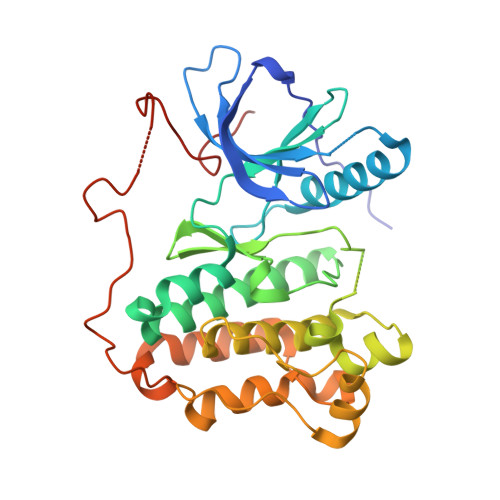Noncovalent Mutant Selective Epidermal Growth Factor Receptor Inhibitors: A Lead Optimization Case Study.
Heald, R., Bowman, K.K., Bryan, M.C., Burdick, D., Chan, B., Chan, E., Chen, Y., Clausen, S., Dominguez-Fernandez, B., Eigenbrot, C., Elliott, R., Hanan, E.J., Jackson, P., Knight, J., La, H., Lainchbury, M., Malek, S., Mann, S., Merchant, M., Mortara, K., Purkey, H., Schaefer, G., Schmidt, S., Seward, E., Sideris, S., Shao, L., Wang, S., Yeap, K., Yen, I., Yu, C., Heffron, T.P.(2015) J Med Chem 58: 8877-8895
- PubMed: 26455919
- DOI: https://doi.org/10.1021/acs.jmedchem.5b01412
- Primary Citation of Related Structures:
5C8K, 5C8M, 5C8N, 5CAL, 5CAN, 5CAO, 5CAP, 5CAQ, 5CAS, 5CAU, 5CAV - PubMed Abstract:
Because of their increased activity against activating mutants, first-generation epidermal growth factor receptor (EGFR) kinase inhibitors have had remarkable success in treating non-small-cell lung cancer (NSCLC) patients, but acquired resistance, through a secondary mutation of the gatekeeper residue, means that clinical responses only last for 8-14 months. Addressing this unmet medical need requires agents that can target both of the most common double mutants: T790M/L858R (TMLR) and T790M/del(746-750) (TMdel). Herein we describe how a noncovalent double mutant selective lead compound was optimized using a strategy focused on the structure-guided increase in potency without added lipophilicity or reduction of three-dimensional character. Following successive rounds of design and synthesis it was discovered that cis-fluoro substitution on 4-hydroxy- and 4-methoxypiperidinyl groups provided synergistic, substantial, and specific potency gain through direct interaction with the enzyme and/or effects on the proximal ligand oxygen atom. Further development of the fluorohydroxypiperidine series resulted in the identification of a pair of diastereomers that showed 50-fold enzyme and cell based selectivity for T790M mutants over wild-type EGFR (wtEGFR) in vitro and pathway knock-down in an in vivo xenograft model.
- Argenta, Early Discovery Charles River , 7/9 Spire Green Centre, Flex Meadow, Harlow, Essex CM19 5TR, United Kingdom.
Organizational Affiliation:

















